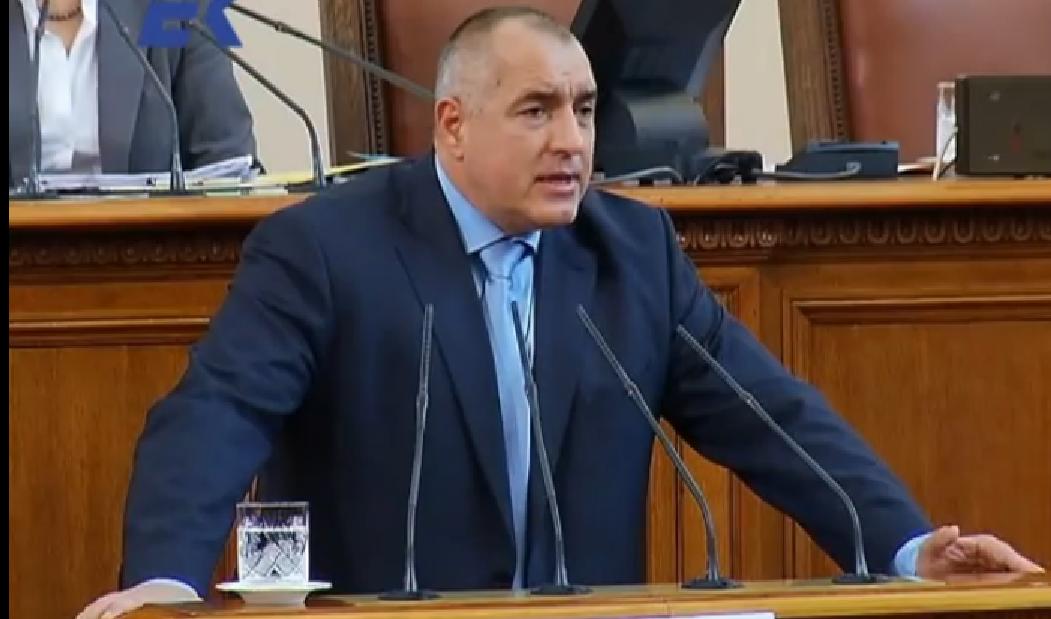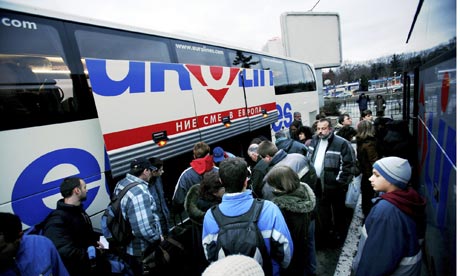
Bulgaria’s parliament recently approved a new center-left government, ending a three-month stalemate after the previous center-right government resigned in February 2013 amidst widespread anti-austerity protests. The February protests were the largest that Bulgaria has seen since the fall of communism, with more than 100,000 Bulgarian citizens mobilizing themselves against poverty, high energy bills and widespread political and social corruption. Despite the seriousness of the task it faces, which includes addressing the protesters’ grievances and ensuring Bulgaria’s economic development, due to a lack of parliamentary majority, the new government is unlikely to bring any significant changes and distance itself from the previous one.
Boiko Borisov, the ousted Prime Minister and leader of GERB (Citizens for European Development of Bulgaria), entered office in 2009 with significant popular support. However, his inability to fulfill his promises angered Bulgarian citizens. When he first gained power, Borisov promised to eradicate organized crime and tackle Bulgaria’s corruption. Yet, a series of corruption scandals conducted under his rule led the European Commission to partially freeze European funding for infrastructure and other projects. Corruption in Bulgaria remains systemic, present not only on the political stage but in the daily life of citizens who, when dealing with state administration, frequently have to resort to some form of bribery to receive needed services. The failure to tackle this corruption was one of the key grievances of the protestors
Another key complaint was the rising cost of energy bills resulting from incorrectly calculated energy expenses, which often included costs like “high efficiency cogeneration” and “stranded costs,” rendering customers often unaware of what they are paying for. It is believed that the prices are inflated in order increase the revenues of the three private energy distribution holdings and to pay for theft and unpaid bills.
Since the Bulgarian energy distribution network was privatized in 2004, these three holdings have effectively monopolized the regions they served. Exacerbating all of these complaints is a background of often dire poverty. Bulgaria is currently the poorest country in the European Union, with around 20 percent of the population living below the poverty line and this number is set to rise as unemployment soars. According to Eurostat, the unemployment rate went from 6.8 in 2009 percent to 12.3 percent of population in 2012.
In response to the protests, Borisov resigned prompting new parliamentary elections which were held on May 12, 2013. His party, GERB, only won 97 seats in the new elections, failing to secure the 121 votes needed for a parliamentary majority. This allowed the second strongest party, the Socialist party, to form a government. Holding only 84 seats in the parliament, the Socialists engineered a coalition with the Movement for Rights and Freedoms, a mainly ethnic Turkish minority party, which had 36 deputies, thus securing a total of 120 votes in the 240-member parliament. Nevertheless, they were one vote short of majority, so the decision relied on the ultra-nationalist Ataka party. While Ataka’s leader refused to back any government and claimed to become “a nightmare” for any government, the decision of some of its parliamentarians not to register for the government-related vote lowered the majority threshold, allowing the Socialist government to be appointed.
The newly voted-in 15-member technocratic government was supported by the Coalition, which holds 120 votes in the 240-member parliament. Since its approval was reliant upon several opposition members’ abstaining from the vote, it lacks the backing of a parliamentary majority, meaning that it will often have to plead for opposition support during votes. While budget cuts will certainly be made, it will be especially difficult to enforce reforms on inefficient labour, healthcare and education.
Analyzing the Coalition between the Socialists and the Movement for Rights and Freedoms, Borisov affirmed that it is “an unprincipled alliance of parties with irreconcilable differences,” implying that, even amongst themselves, they will be unable to agree in voting on certain issues. Of course, it is not surprising that the new opposition member would make a rather vitriolic affirmation. Nevertheless, his statement could hold some truth to it, given the two parties different constituencies. The Movement for Rights and Freedoms is likely not only to seek to promote the interests of the Turkish minority, but also to oppose any initiative that it regards as harmful to its constituents.
The Parliament also elected a new Prime Minister, Plamen Oresharski, who had served as finance minister in the Socialist-led government between 2005 and 2009. Speaking at his government’s inauguration, Oresharski restrained from making any concrete promises and offered a rather bleak perspective for his country’s citizens: “Bulgaria is in a deep institutional crisis, continuing economic depression and worsening social disintegration. (…) Maybe we won’t be able to become rich and prosperous in our term, but our minimum task is to give Bulgarians more hope and more confidence that we are on the right track by the end of our term.”
Oresharski announced that a key priority for the new government will be to overhaul the inefficient energy sector and lower energy prices, which were the main cause of the February protests. The newly appointed Minister of Economy and Energy has already announced that the final result in the changes made in the energy sector should ensure zero increase in electricity prices. It also announced that the more people will be eligible next winter for vouchers to pay increasing electricity bills. Based on these officials’ announcements, it seems unlikely that the government will seek to re-nationalize energy distribution, as was demanded during the popular protests, but instead focused on improving the existing system. Unless the government finds a adopts measures to significantly reduce and stabilize energy prices, they will remain an important element of discontent for the Bulgarian population, which could mobilize it to demonstrate again.
A key aspect that the Prime Minister did not address is fighting corruption, one of main grievances of the February protesters. In Bulgaria, high-level political corruption has remained virtually unchallenged, partly because, as a result of the political control over the police, investigations are conducted only in the case of low-level civil servants in the central and local administrations. Politicians, especially those in the parliament, are unlikely to approve any decision that would hamper their or their friends’/colleagues’ activities. The GERB is already mired in allegations of corruption but retains a considerable force in parliament, while members of the Socialist party, Movement for Rights and Freedoms and Ataka are also not exempt from corrupt undertakings. As long as the parliament remains dominated by corrupt individuals, unwilling to put an end to their practices, no anti-corruption legislative proposal can be approved. Nevertheless, failing to adopt efficient solutions for high-level political corruption and focusing exclusively on administrative corruption, as did the previous government, will not sit well with the Bulgarian population.
The Prime Minister also did not offer much information in regards to tackling poverty. He announced that his government would maintain a flat 10-percent income tax, which, among other things, means that the lower income taxpayers will continue to bear most of the burden. Although promising an increase in social benefits for the poor and families with young children and in pensions for retired people, no salary increases will be possible at least until 2014. In a country where the average income is 400 euros, these measures will likely be unsatisfactory.
With many complex challenges facing Bulgaria, the new government is unlikely to bring any substantial changes, mainly because of its lack of a parliamentary majority, which would allow it to pass its agenda more easily. Nevertheless, the Prime Minister set bleak, but realistic expectations for the population. Therefore, it will be interesting to observe whether or not the Bulgarian population will be willing to accept slow-paced small reforms or will once more take to the streets to demand faster development and changes for their country.
Raluca Besliu is a masters student in Refugees and Forced Migration Studies at Oxford.





No Comment